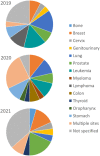Cancer Research in the Time of COVID-19: A Colombian Narrative
- PMID: 35059373
- PMCID: PMC8764311
- DOI: 10.3389/fpubh.2021.750755
Cancer Research in the Time of COVID-19: A Colombian Narrative
Abstract
Cancer research is deficient in Colombia and efforts and resources diverted due to the COVID-19 pandemic could worsen the situation. We explore the impact of the pandemic on cancer research funding, output, and conduct. We sought information at national level and used the experience of an academic reference center to contrast the impact at institutional level. We searched databases and official documents of national governmental institutions, trial registries, hospital registries, and the Web of Science. We interviewed principal investigators (PIs) to retrieve information on the conduct of cancer research. A decline in resource availability and new proposals was observed at the national level with a shift to COVID-19 related research. However, at institutional level there was no decline in the number of cancer research proposals. The predominance of observational studies as opposed to the preponderance of clinical trials and basic science in high-income countries may be related to the lower impact at institutional level. Nevertheless, we found difficulties similar to previous reports for conducting research during the pandemic. PIs reported long recovery times and a great impact on research other than clinical trials, such as observational and qualitative studies. No significant impact on research output was observed. Alternatives to ensure research continuity such as telemedicine and remote data collection have scarcely been implemented given limited access and low technology literacy. In this middle-income setting the situation shows a notable dependency of international collaborations to develop research on COVID-19 and cancer and to overcome challenges for cancer research during the pandemic.
Keywords: COVID-19 pandemic; Colombia; cancer publications; neoplasms; research priorities.
Copyright © 2022 Murillo, Fernández-Deaza, Zuluaga, Lewison, Usgame-Zubieta, Usgame-Zubieta and Manrique.
Conflict of interest statement
The authors declare that the research was conducted in the absence of any commercial or financial relationships that could be construed as a potential conflict of interest. The handling editor declared a shared committee with one of the authors RM at time of review.
Figures



References
-
- The World Bank. DataBank. (2021). Available online at: https://databank.worldbank.org/home.aspx (accessed June 15, 2021).
-
- Lewison G, Owen GI, Gomez H, Cazap E, Murillo R, Saldaña KU, et al. . Cancer research in Latin America, 2014–2019, and its disease burden. J Scientometr Res. (2021) 10:s21–31. 10.5530/jscires.10.1s.19 - DOI
-
- Serrano ML, Carreño Dueñas JA. Productividad científica de las líneas de investigación y su contribución para el control del cáncer en Colombia. Rev Colomb Cancerol. (2016) 20:167–74. 10.1016/j.rccan.2016.11.002 - DOI
MeSH terms
LinkOut - more resources
Full Text Sources
Medical

